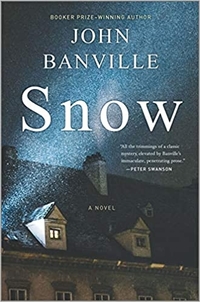Jeeves and the Leap of Faith by Ben Schott
 Wednesday, October 14, 2020 at 7:41AM
Wednesday, October 14, 2020 at 7:41AM 
Published by Little, Brown and Company on October 13, 2020
Jeeves and the Leap of Faith is Ben Schott’s second homage to P.G. Wodehouse. It is, I suspect, the first Jeeves novel to end with a cliffhanger. The hanging question involves romance, and for once the question isn’t how Bertie Wooster will escape an impending engagement. In fact, Bertie deftly avoids romantic entanglements throughout the novel, with the able help of Jeeves.
As fans of Bertie Wooster well understand, nothing good comes of having an English aunt. They are given to arranging unwanted marriages and scolding, reacting to poor displays of posture and manners with swift correction and responding to tardiness with “What time do you call this?” They live in a place of their own invention where standards are kept and stations are known. Bertie plainly does not occupy that realm. At Oxford, Bertie was more admired for night climbing than for scholarship (night climbing: a sport involving the scaling of old buildings that school administrators wish to discourage despite its venerable tradition). In the present, Bertie banters with his friends at the Drones Club, gambles on unlikely competitions, ponders crossword clues until Jeeves suggests an answer, experiments with hangover cures, haggles with Jeeves about clothing and wallpaper choices, and does his best to avoid being productive.
This book has more of a plot than the typical Wodehouse Jeeves novel, in that Schott focuses part of the story on Jeeves’ role as a clandestine agent of the British government. Fortunately, the plot does not distract the reader. The Wodehouse books were, like Bertie Wooster’s life, delightfully aimless, and Schott again captures Bertie’s essence. Still, as a service to the government, Bertie does impersonate a man of the cloth (making rather a bungle of the prayers) and tests his night climbing skills, culminating in a leap between buildings to which the title alludes.
The novel takes us to the racetrack in the hope that the Drones Club (with the help of Jeeves) can pay its back taxes with a well-placed bet. Other eventful moments largely involve romance (or the lack thereof). Bertie conspires to avoid the latest match contrived by his aunt while various friends and enemies pursue a confusion of women, including a maid who is apparently an old flame of Jeeves. The same aunt has been trying to convince Bertie to discharge Jeeves, so another scheme must be concocted (with Jeeves’ help) to avoid calamity. A diamond heist lurks in the background.
Schott has given intense study to Wodehouse and his characters, as is evidenced by the extensive notes he appends to the text. For the casual reader, it suffices to understand that there is little distance between Schott’s version of Bertie and Jeeves and the originals as crafted by Wodehouse. The writing style and dialog are much the same, as is the flavor of the stories. The plot, such as it is, is light and silly and full of the digressions that characterized Wodehouse’s work.
The Wodehouse novels are celebrated as some of the best comedic works of the first half of the twentieth last century. I suspect that most Wodehouse fans can’t get enough of Bertie and Jeeves. Thanks to Schott, the Jeeves well has not yet run dry.
RECOMMENDED
 TChris |
TChris |  Post a Comment |
Post a Comment |  Ben Schott,
Ben Schott,  comedy in
comedy in  General Fiction
General Fiction 


